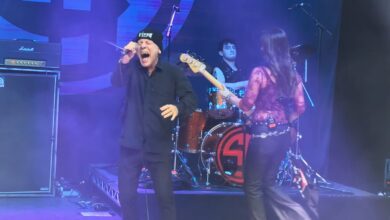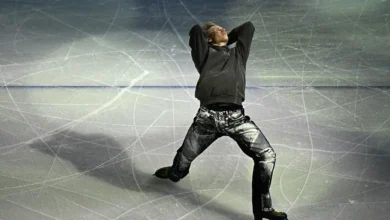Heart’s 1977 “Crazy On You” Performance: A Timeless Showcase of Power and Grace
In the late-’70s rush of televised rock, one performance of “Crazy On You” stands out: Heart delivering the song live on The Midnight Special in 1977, a showcase that captured their ferocity without safety nets. Cameras panned from Nancy’s acoustic fire to Ann’s towering vocal, documenting a band proving everything in real time—no pitch correction, no backing track, just command. That broadcast helped set the song in stone as a live standard.
“Crazy On You” comes from Heart’s debut album, Dreamboat Annie, first issued in Canada in 1975 and in the U.S. soon after, with the single released in March 1976. Its dynamic blueprint—whiplash-fast acoustic verses detonating into electric surges—became a calling card, showing how the band fused folk textures with hard-rock muscle in a way that felt new for radio.
What makes that 1977 rendition feel timeless is Ann Wilson’s vocal authority. She doesn’t simply sing the melody; she hurls it skyward, then reins it back with surgical control. It’s the kind of performance that invites comparisons to the all-time greats—Plant, Mercury, Perry, Houston—because it lives at the intersection of power, range, and finesse, and it sounds every bit earned.
Before Ann’s first lyric lands, Nancy Wilson’s acoustic prelude throws down a gauntlet. That fingerstyle burst—intricate, percussive, and rhythmically relentless—functions like a drumline and rhythm guitar at once. It announces the song’s heartbeat and dares the band to keep up. The intro isn’t flash for its own sake; it’s architecture, a frame that holds everything that follows.
Nancy has explained that the intro, often called “Silver Wheels,” was shaped by progressive acoustic ideas of the era and even nods to outside inspirations. That DNA—complex right-hand patterns, brisk chordal motion, and dynamic accents—turns a six-string into a small orchestra. When the full band slams in, the contrast feels volcanic precisely because the prelude is so taut and musical.
Lyrically, “Crazy On You” merges private tenderness with public turbulence. Ann Wilson has described how the song channels both romantic intensity and the ambient fear of the times, touching on the Vietnam era’s anxieties while keeping the narrative intimate. That dual focus is why the verses feel breathless and urgent, and why the chorus lands like exhale and confession at once.
Onstage in 1977, those themes read across Ann’s phrasing: she leans into quick syllables without losing pitch center, then opens vowels wide when the band crests. Meanwhile Nancy’s acoustic keeps kicking dust, acting like a metronome with attitude. The ensemble dynamic—acoustic against electric, steel against silk—made the performance feel both radio-ready and dangerously alive.
Commercially, the track announced Heart as a force beyond novelty. The single reached No. 35 on the U.S. Billboard Hot 100, hit No. 25 in Canada, and later soared to the Top 2 in the Netherlands, proof that its cross-genre hooks traveled well. Those numbers tell only part of the story; the rest is how often fans still return to it.
For anyone who grew up in the ’70s, moments like this were rites of passage. You sat too close to the TV, volume creeping higher, waiting for the chorus to detonate. Ann’s voice made you believe rock could be both thunderous and elegant. Nancy’s guitar gave you a blueprint for daring without distortion. Being a teenager then really did feel like front-row history.
By design, the arrangement invites escalation. The pre-chorus tightens like a coiled spring; the chorus releases pressure while Ann blooms on the high notes. Live, that dynamic becomes a physical event—the kind that makes you want to stand up in a living room and shout along, even if the only audience is a flickering CRT and a stunned younger self.
The 1977 TV performance didn’t freeze the song in amber; it set a standard Heart kept meeting. Decades later, the band returned to “Crazy On You” during their Rock and Roll Hall of Fame induction in 2013, reuniting with original members and reminding everyone that the song’s teeth were still sharp, its pulse still urgent, its difficulty still a dare they could meet.
Part of why this cut resonates is that it’s not escapism; it’s resistance wrapped in romance. In recent interviews, the Wilsons have acknowledged how the lyrics reflected unease with the political climate of the era, which adds a documentary layer to the song’s rush. The performance sells the emotions first; the subtext reveals itself on repeat listens.
As a document of musicianship, that ’77 showing is a small masterclass. Watch Nancy’s right hand for the constant drive; listen to Ann’s breath discipline between those punishing phrases. The band never outruns the acoustic engine; they draft behind it and slingshot out at the chorus. It’s technical and visceral at once—the sweet spot where great rock lives.
Heart’s broader legacy matters here, too. The Wilson sisters were pioneers—the rare women fronting a hard-rock band on major TV stages, writing, arranging, and owning the narrative. Performances like this didn’t just entertain; they carved room for others who saw themselves on that stage and decided to pick up a guitar, step to a mic, and refuse to blink.
Call “Crazy On You” soft rock if you like; live, Ann’s raw intensity turns the dial past gentle and into something that begs to be loud. That’s why fans keep returning decades later. You don’t just hear the notes—you feel the stakes. And when Ann blasts that final refrain, you remember why some voices get mentioned with the immortals, and why this one still makes you turn up the volume.





